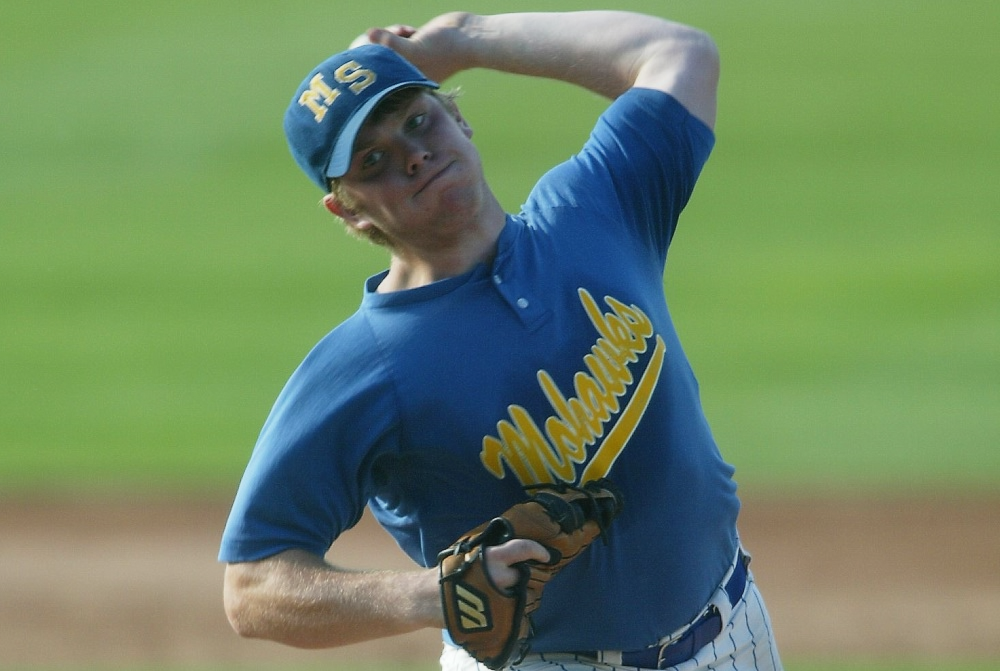
Decades Later, Wernette's Wondrous 2003 Remains Nearly Unchallenged
By
Steve Vedder
Special for MHSAA.com
April 24, 2023
Nate Wernette knew his final spring at Morley Stanwood had been special, but he had no idea just how historic it was until a strange visitor showed up at the family home near Stanwood just weeks after the baseball season ended.
The man, completely unknown to the family, produced a number of framed newspaper clippings and several pages of well-documented statistical research on Wernette's recently completed senior season at Morley Stanwood. The numbers showed that Wernette, a pitcher whose skill set fell somewhere between being a hard thrower and crafty left-hander, had accomplished even more than suspected at first glance.
In fact, the research showed that Wernette's senior year arguably was the single greatest pitching season in the history of Michigan high school baseball.
"We never had any idea," said Wernette on the eve of the 20th anniversary of that historic season in 2003.
Wernette was vaguely aware that his 20 pitching wins had broken the state record of 19 wins set by Brandon LaTour of Blissfield in 1992. The pair remain among only four pitchers in state history with at least 17 wins in a single season.
But as the man's research pointed out, that feat was just the tip of the iceberg. The 20 wins pushed Wernette's career total to 56, a state record that remains seven better than Homer's Josh Collmenter's eventual total of 49 from 2001-04. What Wernette also didn't realize was his 272 season strikeouts smashed the previous record of 215 by Southgate Aquinas’ Dan Horvath from 1998 and would outlast a challenge of 223 by Collmenter in 2004, and that Wernette’s average of 15.2 strikeouts per game was at that time second (and now fourth) all-time in state history. Wernette finished his career with 583 whiffs, second in state history.
He also tossed four no-hitters that season, second on the all-time list. Three of those no-hitters, in fact, came in consecutive dominant starts from May 6-10.
While Wernette was pitching himself into the Michigan high school record book, National Federation of State High School Associations (NFHS) research shows where Wernette's numbers stand nationally. It turns out that only 10 pitchers in the country's history have won more than 20 games in a season. The all-time mark is 25 by Randolph Slaters of Mooreville High School in Missouri in 1985. Wernette’s 272 strikeouts is fourth all-time, with Salters also holding that record at 336. The 56 career wins is sixth all-time, with Terry Heiderscheit of Lansing Kee High School in Iowa holding the record of 69 from 1975-78.
Wernette admits it's probably best that he was unaware of the records at the time. His focus was on being the only senior on a young 10-player Morley Stanwood team that many suspected would be lucky to break .500 in 2003. But behind Wernette's sensational season, Morley Stanwood finished 41-3, with Wernette suffering his only defeat 3-1 to Blissfield in the Division 3 championship game.
"I was kind of glad I didn't know. Who knows what would have been in the back of my mind if I knew I was that close (to the records)," he said. "I never thought that much about it. I didn't know about the strikeout record, and I never looked at my (won-loss) record until someone mentioned that I was close to 50 and that I could break the state record."
Wernette remembers starting about 17 games that season as at least a couple of the wins came in relief. The success also didn't exactly come out of the blue as Wernette went 7-5 as a promising freshman, then put together 14-3 and 15-4 seasons as a sophomore and junior, respectively. The 15 wins remain tied for 10th all-time in state history.
Wernette's catcher his final season was sophomore Drew Thompson, who remembers Wernette as having a fastball that touched 90 mph at best. He never threw a curveball until making the high school team and really didn't master it until his last season and a half for Morley Stanwood. But Wernette, an all-conference football linebacker, had a relentless competitive streak, Thompson recalled.
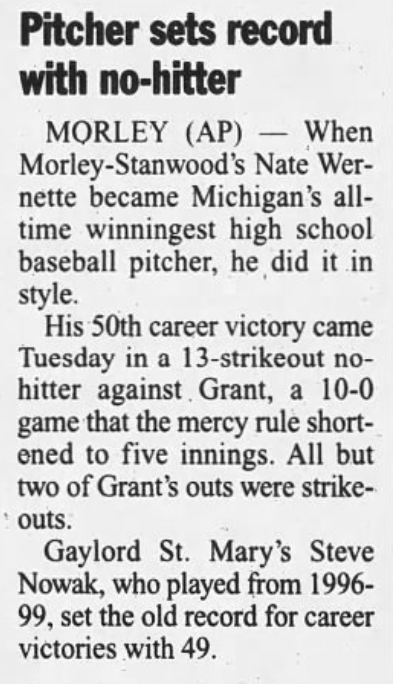 "There was his velocity and the way he threw balls that tailed away from batters," Thompson said. "A lot of high school hitters never saw balls that would move away like that. But he was a gamer who just wanted the ball in his hand. If he got into trouble, he wanted a strikeout and he had the stuff to do it.
"There was his velocity and the way he threw balls that tailed away from batters," Thompson said. "A lot of high school hitters never saw balls that would move away like that. But he was a gamer who just wanted the ball in his hand. If he got into trouble, he wanted a strikeout and he had the stuff to do it.
"Everything fit together for him that year. He had confidence we would win whether we were down 1-0 or 2-1 or we were up. I remember him always being relaxed."
Wernette agrees everything indeed did fall into place that season. One of four Mohawks pitchers who could throw at least 80 mph, Wernette's place in the rotation included starting twice during the week while occasionally relieving in a weekend tournament. By the time the team was around 16 games into the season, Wernette realized something special was happening. The team played well in the usually strong Big Rapids Tournament, where the Mohawks swept Remus Chippewa Hills and Big Rapids. Morley Stanwood split a key doubleheader with Howard City Tri County, and suddenly Wernette and a painfully young Morley Stanwood club that virtually had returned little else than its No.1 pitcher was catching fire.
Wernette's 20th win came in a 3-2 decision over Rudyard in a Quarterfinal at Gaylord. Because rain on Tuesday had pushed the game back a day to Wednesday, Wernette was unable to start the team's Semifinal on Friday. But even without Wernette, the team's No. 3 hitter and first baseman when he wasn't on the mound, Morley Stanwood beat a 35-4 Goodrich team 4-3 in the Semifinal, paving the way for Wernette to pitch the Final. But Morley Stanwood made a couple key errors in the title game, and Blissfield pitcher Jake Recker – who had only a modest 4-4 record heading into the day – was excellent in a 3-1 win. The championship was part of three Finals titles over four years for Blissfield.
Wernette said his reflections on his heavy pitching load that season haven't changed in 20 years. He would take the ball whenever coach Ron Ford asked him.
"I never told him I couldn't pitch," Wernette said. "My arm never bothered me. I'd ice it after a game, and I never had an arm issue. Looking back now I know I threw more than a lot of high school pitchers, but I was all for it. I wanted the ball every chance I could get it."
While Wernette never suffered a sore arm during four years in high school, his pitching career ended five months after graduation. After attending a Detroit Tigers tryout in Grand Rapids, Wernette was advised he needed a year in college. So he shuffled off to Muskegon Community College, where during the opening weeks of fall ball, Wernette hurt his shoulder during a long toss exercise. While medical evaluations have made great strides in the last 20 years, Wernette said the numbness he felt probably meant a torn rotator cuff. He never tried pitching again.
"I probably should have stuck with it, and that's the biggest thing with me because baseball was so special," he said. "I took the game seriously, but the rest of it – like school – I wish I would have put more into it.
Wernette's spark for pitching is reflected in his two young daughters, Brooklynn, 11, and Jaycee, 8. Both are travel softball pitchers. Wernette said the family has a pitching machine set up to hone their talent.
"They're definitely into it," he said.
The records that Wernette set are probably untouchable as high schools have instituted tight mandates on the number of pitches that can be thrown over a certain number of days. For instance, the top pitchers on last year's 16 MHSAA semifinalists averaged 10.6 starts and 57.5 innings pitched. Wernette threw 125 innings as a senior.
Wernette heartily agrees there should be definite pitch limits on youngsters whose arms are not fully developed.
"I definitely see it as a good thing," he said. "Back then you never heard much about Tommy John surgeries of rotator cuffs. I never learned about that stuff until after school. I never had any concerns; I just wanted the ball every chance I could get it."
As for Wernette's remarkable season, he spends little time thinking about the achievements unless someone mentions them. But it's hardly comparable to the Bruce Springsteen "Glory Days" song of yesterday's greatness.
"Somebody will bring it up, and I have a lot of good memories. But I wish I would have done some things differently like paying more attention to school and applying myself. There was too much of just trying to get by," he said.
"But it was an honor to accomplish what I did. I'll always think that."
PHOTOS (Top) Morley Stanwood’s Nate Wernette makes his move toward the plate during the 2003 Division 3 Final against Blissfield. (Middle) Wernette’s record-setting win made the statewide news wire, appearing in various newspapers including as this clip in the St. Joseph Herald-Palladium.
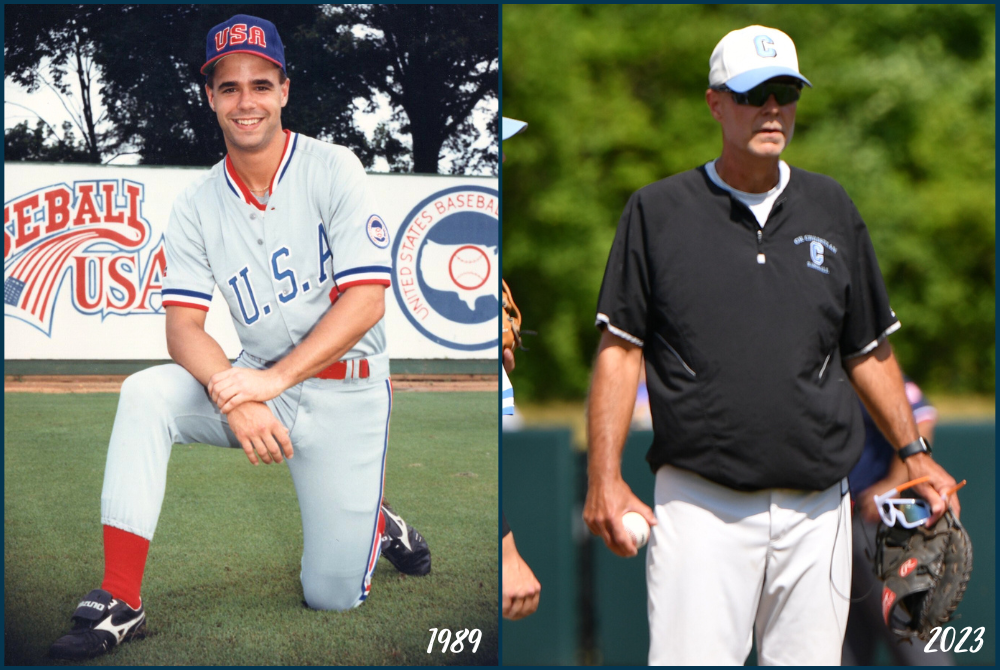
Vast Experience Shapes Retired MLB-er Gates Into 3-Time Finals-Winning Coach
By
Steve Vedder
Special for MHSAA.com
August 1, 2023
If there is anything that Brent Gates knows for sure, it's that there is no single explanation for three MHSAA Finals baseball championships.
 For starters, the Grand Rapids Christian coach credits the superior coaching he had as a youngster, especially for helping him make the Michigan High School Baseball Coaches Association Dream Team in 1988.
For starters, the Grand Rapids Christian coach credits the superior coaching he had as a youngster, especially for helping him make the Michigan High School Baseball Coaches Association Dream Team in 1988.
From there, Gates points to the experience gained as a former Big 10 Baseball Player of the Year, a seven-year major league playing career that saw him rubbing shoulders with such notables as Hall-of-Famer Tony LaRussa and Minnesota Twins manager Tom Kelly, and then landing at a high school where the critical support he received from players, community and administration was priceless.
Put it all together and that, at least in part, explains Gates becoming the first Grand Rapids-area baseball coach with three state titles on his resume.
The Eagles' 2-1 win over Grosse Pointe Woods University Liggett in the June 17 Division 2 Final marked Gates' third title as a coach. His Grand Rapids Christian clubs had previously won back-to-back titles in 2012-13.
Gates passed former Grandville Calvin Christian coach Jay Milkamp as the Grand Rapids-area coach with the most state titles. Milkamp won in 1994 (Class C) and 1996 (Class B).
Gates, a member of three Halls of Fame, is quick to deflect the credit for three championships and two other championship game appearances. What he treasures most is being mentioned in the same breath as other legendary west-side coaches such as Jenison's Gary Cook, Ron Engels of Wyoming Park, Hudsonville's Dave Van Nord, East Grand Rapids' Chris LaMange, formerly Rockford and now Ada Forest Hills Eastern's Ian Hearn and Milkamp, most of whom Gates either played against while an all-stater at Grandville or through coaching at Grand Rapids Christian.
"I'm just a small piece of what has transpired in 11 years," he said. "Just to be mentioned with them and their success is an honor. (Three titles) is not an individual thing, but because of many people and what they can do working day in and day out together.
"I've always said the west side doesn't get the recognition it should in baseball. There are some great coaches here with great baseball talent, and I think you see that in the postseason."
If basketball can spawn what is affectionately known as "gym rats," then Gates is surely a classic example of the diamond's version of someone who has lived and breathed baseball his entire life. He was a two-time all-stater at Grandville who went on to a standout career at the University of Minnesota that included a lifetime .387 batting average. He was named the Big Ten Player of the Year in 1991 and consensus All-American. Gates played internationally with USA Baseball on the 18U team in 1988 and then the collegiate national team in 1989 and 1990. Over those two seasons on the collegiate team he appeared in 68 games, hitting a combined .363 with 49 runs scored and 54 RBIs.
He was drafted by the Oakland A's in the first round (26th overall) of the 1991 draft and went on to hit .264 in 685 major league games over seven seasons.
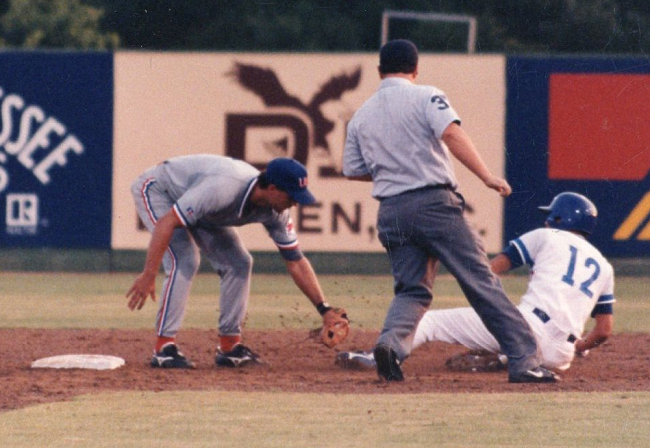 Upon his retirement, Gates founded the Frozen Ropes training facility in Grand Rapids, worked as a scout for the Tampa Bay Rays, became the West Michigan Whitecaps' second-ever manager in 2001, coached Byron Center for two years and has compiled a remarkable 298-89 record in two coaching stints at Grand Rapids Christian.
Upon his retirement, Gates founded the Frozen Ropes training facility in Grand Rapids, worked as a scout for the Tampa Bay Rays, became the West Michigan Whitecaps' second-ever manager in 2001, coached Byron Center for two years and has compiled a remarkable 298-89 record in two coaching stints at Grand Rapids Christian.
After virtually a lifetime in baseball, Gates said his coaching success can be spread in many directions. He said it began at Grandville, was influenced by such managers as John Anderson at Minnesota and LaRussa and Kelly at the major league level, and with brushing shoulders with many of Grand Rapids' most successful coaches.
The experience led him to a coaching philosophy that includes a priority on building relationships with players, providing a full explanation of his thinking to the players, a quiet but firm coaching of fundamentals, and, above all, communication. If there is anything that Gates does not do, it's relying on the "old-school" coaching method where coaches demand excellence in no uncertain terms.
"I've taken little bits and pieces from a lot of people," said Gates, a member of the Grandville, University of Minnesota and Grand Rapids Halls of Fame. "I want players to figure out who they can be. Whether it's Ken Griffey Jr. as a hitter, Randy Johnson as a pitcher or Terry Steinbach in catching, you don't just take one person and say who can I be? If you want to compete at a high level, you need to be better than anyone you go up against.
"Part of being a good coach, and it doesn't matter if it's a 9U program or high school, is about making players understand and be able to apply what they learn. Baseball is a hard game, one of failure where if you succeed three times out of 10, you're a star. You have to get players to understand failure."
Gates said all three Grand Rapids Christian champions were marked by different strong suits. The 2012 club, for example, breezed its way to a 36-5 record, while the 2013 club finished the regular season just 12-15 but put together a torrid seven-game winning streak during the tournament. This year's team was marked by a deep pitching staff and what Gates describes as a "group of gamers."
"All of them were different, but I firmly believe that pitching and defense win championships," Gates said. "But you also have to get hot at the right time."
It's not unusual for major leaguers to completely hang up the spikes once their playing days are over. They're tired of the pressure, the frustration of fading talent and losing the battle with Father Time, and the constant travel away from family. Gates faced all that and still found himself enthralled with the idea of coaching.
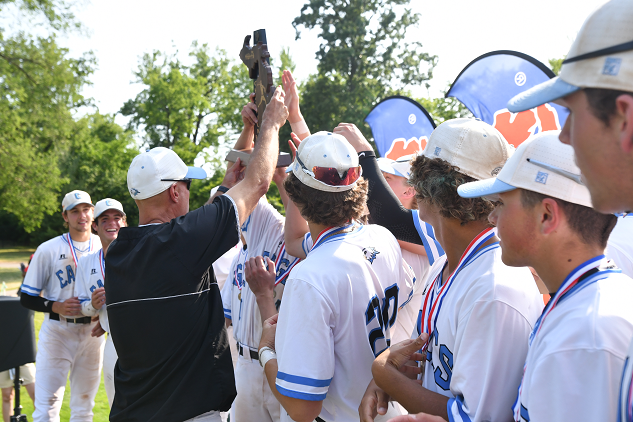 "I've loved the game since I was like 4 years old. There's nothing better than smelling pine tar or the look of manicured grass. The smells and sounds of baseball, that's what I love," he said.
"I've loved the game since I was like 4 years old. There's nothing better than smelling pine tar or the look of manicured grass. The smells and sounds of baseball, that's what I love," he said.
One of his coaching goals is to impart the love of the game to his players. And it seems the message is getting across.
"It's awesome playing for him," said first baseman/pitcher Ty Uchman, who graduated this spring. "He gets us to focus on the little things. If there is something on our minds, we know we can go to him. He's an open book. I know he'll always talk to us, and that builds trust and a bond."
Another recent grad, infielder Kyle Remington, will follow Gates' footsteps to the University of Minnesota and said one particular trait sticks out to him about his coach.
"He's very patient," Remington said. "There are all levels of players in high school, and he treats them all the same. Doesn't matter if they're struggling; he never raises his voice. He's a very comfortable and relatable coach to play for.
"He knows baseball is a game of failure so if you don't understand a drill or an adjustment to have to make, he'll talk to you in a patient way."
Gates said he suspected even when he was a major leaguer that coaching was likely in his future.
"I did, and it was an easy decision. God has a plan, and I had a feeling I would stay in the game," he said. "Baseball has given me everything. I love the game, and I know I've been blessed. I want to take what I've learned and pass it along. That's always been a part of me."
2023 Made In Michigan
July 25: After All-American Career, Rockford's Bennett Making Impact as Mat Mentor - Read
July 20: Oakridge 3-Sport Star Potts Applying Lessons to 'Second Chapter' in Sales - Read
July 18: Frankfort Hoops Staff Bolstered by Past Stars Giving Back in Banktson, Kreski - Read
July 12: Championship Memories, High School Tennis' Impact Stick with Hackett Pair - Read
July 6: Brother Rice Finals Hero Aiming to Ace Family Life, Financial World - Read
July 5: Lapeer West 4-Time Finals Winner Set to Build Champions at Oklahoma - Read
PHOTOS (Top) Brent Gates appears on the USA Baseball collegiate national team in 1989 and makes a pitching change during this spring’s Division 2 Final. (Middle) Gates makes a tag at second base while playing for the national team. (Below) Gates presents the championship trophy this season to his Grand Rapids Christian players. (National team photos courtesy of USA Baseball.)

